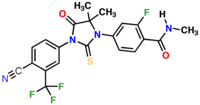
Photo from wikipedia
As a member of Eph subfamily receptor tyrosine kinases, EphA2 has been extensively studied in cancer. It is frequently overexpressed in many different types of human cancer, which is often… Click to show full abstract
As a member of Eph subfamily receptor tyrosine kinases, EphA2 has been extensively studied in cancer. It is frequently overexpressed in many different types of human cancer, which is often correlated with tumor progression. We reported recently that EphA2 has diametrically opposite roles in regulating PCa cell differentiation, proliferation, migration, and invasion. In the presence of ligands called ephrin-As, EphA2 canonical signaling inhibits Ras/ERK and PI3K/Akt pathways and suppressed cell proliferation and migration. In contrast, in the absence of ligands EphA2 mediates noncanonical signaling, which promotes chemotactic migration and invasion and accentuates the tumor cell stem properties. Interestingly the ligand-independent noncanonical signaling is correlated with phosphorylation of EphA2 on serine 897 (S897). S897A mutation abolished this ligand-independent effect on cell differentiation and migration and suppressed tumor development in PC3 xenograft model. In mouse prostate, EphA2 is expressed in the stem cell niche together with its cognate ephrin-A ligands in the peri-urethra region but is repressed in AR-positive, differentiated prostate epithelial cells. During progression toward CRPC, ephrin-ligand expression is reduced while EphA2 is overexpressed, facilitating ligand-independent noncanonical signaling by EphA2. Consistent with the negative roles of AR in regulating EphA2 expression, treatment with anti-AR enzalutamide promotes EphA2 expression. In contrast, activating AR with DHT strongly suppressed EphA2 expression. Knockout of EphA2 in the AR+ LAPC4 cells, delayed progression towards castration resistance in vivo. Our results unveiled the previously unknown functional crosstalk between AR and EphA2, and the important role of EphA2 in the malignant progression of prostate cancer. Citation Format: Ryan Lingerak, Bingcheng Wang. Loss of androgen receptor-mediated repression leads to EphA2 overexpression that promotes cellular dedifferentiation and castration resistance of prostate cancer through noncanonical signaling [abstract]. In: Proceedings of the AACR Special Conference: Advances in Prostate Cancer Research; 2023 Mar 15-18; Denver, Colorado. Philadelphia (PA): AACR; Cancer Res 2023;83(11 Suppl):Abstract nr B018.
Journal Title: Cancer Research
Year Published: 2023
Link to full text (if available)
Share on Social Media: Sign Up to like & get
recommendations!